Classical Conferences and Meetings 2013 |
NB: As best as possible, we also note presentations by B-C authors.
AIA/APA – American Institute of Archeology/American Philological Association Joint Meeting
January 3–6, 2013
Washington State Convention Center and Sheraton Seattle Hotel
Seattle, WA
Representatives: Marie and Allan Bolchazy, Bridget (Buchholz) Dean, Donald Sprague
New York Classical Club
Annual Winter Conference: "Julius Caesar in History and in the Classroom."
Saturday, January 26, 2013, 11 a.m.–6 p.m
Representative: Donald Sprague
Presentation: “Caesar and the State Religion” – Hans-Friedrich Mueller, author, Caesar: Selections from His Commentarii De Bello Gallico; coauthor, Caesar: A LEGAMUS Transitional Reader
CANE – Classical Association of New England Annual Meeting
March 15–16, 2013
University of Connecticut
Storrs, CT
Representative: Donald Sprague
CAMWS – Classical Association of the Middle West and South
April 17–20, 2013
Sheraton Iowa City Hotel
Iowa City, IA
Representatives: Marie and Allan Bolchazy, Bridget (Buchholz) Dean, Donald Sprague
Presentation: "Creating Custom Textbooks" - Bridget (Buchholz) Dean
Information taken from www.BOLCHAZY.com |
|
 |
|
B-C was pleased to send representatives and book displays to three state conferences this fall. Rose Williams represented us at the Texas Classical Association (TCA) while Sherwin Little was the face of Bolchazy-Carducci at the Ohio Classical Conference (OCC) and the Tennessee Foreign Language Teachers Association (TFLTA).
OCC
The Ohio Classical Conference was held October 26–27 at the Fawcett Center on the campus of The Ohio State University. The attendance at OCC this year was a little below average— full attendance was probably around 40. The majority of the folks were from secondary schools and about 10–12 were from colleges or universities. A Columbus location is ideal as it readily draws people from all corners of the state—Cincinnati, Columbus, Cleveland, Toledo, Dayton, and Athens. Despite the lower than usual numbers, the attendees represented a good cross-section of the state and enjoyed an interesting program. B-C was the only publisher to send a representative and attendees appreciated the opportunity to examine the books. People were touched by the memorial card for Lou Bolchazy, who died in July. Many people expressed their appreciation for Lou’s inspiration and leadership.
TCA
The TCA Conference, held in Austin on November 2 and 3, offered thoughtful and inspiring studies of both Greek and Latin literature. Throwing new light on Greek studies were Gregory Bucher of Creighton with his presentation on “A Complex Oedipus: The Tragedy of Edward Morbius” and Richard Buxton of UT Austin with his “Performing Innocence: Hermocrates in Xenophon’s Hellinica.” Robert Cape discussed AP* Latin, and Ned Tuck gave a presentation on “Tibullus and the new Latin AP” that had everyone taking notes. On Saturday afternoon Gregory Bucher moved to the Roman side of things with his lively presentation of “The Anecdotal Caesar.” Andrea Stehle’s “Using Riordan’s Lightning Thief Series in the Classroom” helped us keep in touch with the teenage world. Book sales are a fairly new feature of TCA, but interest in the B-C titles was lively.
TFLTA
The Tennessee Foreign Language Teachers Association took place November 2–3 at the Franklin TN Marriott. The Tennessee Classical Association (TCA) holds their fall meeting in conjunction with TFLTA. TCA sponsored a Latin session during each time slot. Some 25–30 Latin folks from secondary schools and universities attended the conference. The Latin teachers were delighted to have B-C in attendance. A number of them are using LNM 3 and noted that they were happy with it and eager to receive the Teacher’s Manual.
Kudos to Diana Tomayko from Brentwood High School, who received the TCA Teacher of the Year award. She was praised in letters from her fellow students, her professors, and her current students. Congratulations to Vanderbilt Classics Professor Daniel Solomon who was named to the Board of TFLTA. |
|
 |
|
Interesting Tidbits to Share |
“Greek Gifts”
The NPR morning news on Monday, November 19, covered President Obama’s visit to Myanmar. NPR’s coverage included a selection of blog messages penned by citizens of the People’s Republic of China. Classicist ears perked up when one of the Chinese blogsters warned that this visit and American interest in Myanmar might be a “Greek gift.” In sharing this item, teachers might probe to see if their students understand that implicit in the allusion is its author’s belief that fellow blogsters in China would readily make the connection intended.
Lincoln and Euclid
One of the trailers for Steven Spielberg’s acclaimed film Lincoln includes the president quoting Euclid to explain his commitment to ending slavery. The following links you to the film clip of the scene and to EE Times for the electrical engineering world’s response. http://www.eetimes.com/electronics-news/4401573/Lincoln--Euclid-and-mechanical-law
Halloween Fame
A profile of University of Nebraska classics professor Tom Winters, “the skateboarding professor” has received record Internet attention. Halloween 2012 saw the creation of a new costume—“the skateboarding professor”! |
|
 |
|
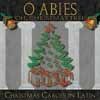
Check out this perennial favorite of Christmas and holiday songs in Latin from “Deck the Halls” to “Jingle Bells.” A perfect way to add some aural/oral Latin learning to your classes.
C.C. Couch sings six of these favorites in the classical Latin pronunciation and six in the ecclesiastical Latin pronunciation. Teddy Irwin, who plays guitar for these songs, did the musical arrangements. Put your classes and yourself in the holiday spirit!
You can purchase a CD, individual songs as MP3 tracks, or all the songs as MP3 tracks. Saving the MP3 tracks on your computer means you never have to worry about “where you stored that CD.”
For a Teaching Tip for O Abies, click.
For your listening pleasure . . .

Domus Visco Exornemus
“Deck The Halls” 2:05 minutes

O Abies, O Abies
“Oh Christmas Tree” 3:21 minutes |
|
|
Important Classics Deadlines |
|
|
Bolchazy-Carducci
Links of Interest |
Preview Bolchazy-Carducci Titles

Preview Bolchazy-Carducci titles before you buy using Google Preview.

Downloadable Products
iPodius - Bolchazy-Carducci Publishers online shop for: audio, software, video, and a treasure trove of teacher created materials in the Agora.

BCP Facebook Fan Page
Become a FAN of Bolchazy-Carducci Publishers, visit our Facebook Fan page for the latest news from BCP.
*AP is a registered trademark of the College Entrance Examination Board, which was not involved in the production of, and does not endorse this product |
|
|
Bolchazy-Carducci textbooks are now available through GooglePlay and DirectDigital (Xplana) eBookstores, with more titles going digital every day! Each eBook offers a variety of tools to enhance the learning process, and eBook distributors are continually adding new features.
What do B-C eBooks currently offer?
eBooks have the same content as our traditional books in print, with these enhancements:

• Searchable
• Adjust text size, typeface, line space
• Free samples of books
• Worry-free archive
• Available on any computer with an internet connection
• Readable on:
- the web (via Windows or MAC computers)
- iPhone, iPad and iPod touch
- Android
- eBook Devices: Barnes & Noble Nook and Reader™ from Sony
GooglePlay ebook information: http://books.google.com/help/ebooks/overview.html
GooglePlay ebook store: http://books.google.com/ebooks

(Formerly Xplana)
• Searchable
• Adjust text size, typeface, line space
•Add notes, customized highlights, and other annotations—all of which are added to the embedded annotation manager for convenient access
• Worry-free archive
• Available on any computer with an internet connection
• Readable on:
- the web (via Windows or MAC computers)
- tablet computers
DirectDigital ebook information
DirectDigital ebook store
How do I purchase a B-C eBook?
Simple! When you are browsing through www.Bolchazy.com, any time you see GooglePlay or DirectDigital eBook logo, click on the logo, and you will automatically be directed to a webpage where you can purchase the eBook.
Can I purchase direct from the distributor?
Yes! If you prefer, you can link directly to our eBook providers’ websites and search by title, by author, or by Bolchazy-Carducci Publishers to locate the title you would like to purchase. The GooglePlay ebooks store offers a preview of the book, including the table of contents and select pages.
What hardware is required?
You can read eBooks on a Mac, PC, iPhone, iPad, Android, or a variety of eReaders. |
|
 |
|

Annually Bolchazy-Carducci publishes a Roman Calendar that includes key dates in Roman history and literature as well as a significant Latin quote for each day of the month. If you didn't receive one, email info@bolchazy.com to request one. We'll send you the 2012–2013 calendar and put you on our mailing list. Or better yet, download it. |
|
|
American Classical League’s 66th Annual Institute is scheduled for June 27–29, 2013 in Memphis, TN at the invitation of the University of Memphis. The December 2012/January 2013 issue of National Geographic Traveler includes Memphis as one of its “20 Must-See Places for 2013.” The article highlights the Stax Museum of American Soul Music as one of the key players in the city’s arts revival and the vibrant local food community—Project Green Fork has certified dozens of Memphis restaurants as sustainable, linking chefs with farmers. So, mark your calendar, make your plans to combine some terrific professional development activities with some great local culture and culinary experiences.

Photo courtesy of Wikimedia Commons. |
|
|
|
|
At this holiday season we recall our Roman forebears who celebrated the Saturnalia and we celebrate our own holiday traditions. We take stock of the past year and make plans and pledges for the New Year. Know that at Bolchazy-Carducci we will renew our pledge to provide books that address the needs of today’s classroom and to give each of our colleagues personalized, prompt service.
Your colleagues at Bolchazy-Carducci Publishers wish you the very best for the season. Throughout the year, we regularly take a break from our daily routine and celebrate—staff members’ birthdays, the holiday seasons, weddings, and the like. When we gather for our annual holiday luncheon, we shall salute you and the relationships we’ve built over the years. The photos below, taken in November as we celebrated the successful reception of our new titles—some dozen this year including the new Caesar and revised Vergil texts—let you put our names and faces together. If you note a special sparkle to Bridget Dean’s smile, we also celebrated her pregnancy! Pardon us—we had not cleared our Italian feast before taking the photos.
Our best wishes to you and your family for a happy holiday season!
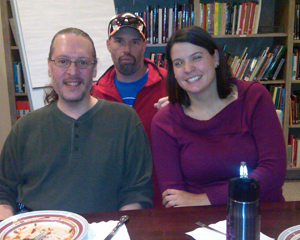
Adam Velez–Sr. Graphic Designer, Mike Frazier–Shipping Specialist, Bridget Dean–Higher-Education Editor
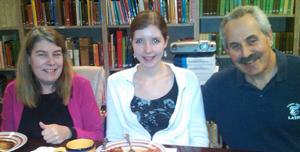
Jody Cull–Production & eProduct Manager, Laurel Draper–Editorial Assistant, David Fiedelman–Director of Finance
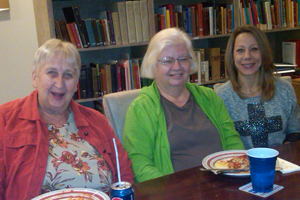
Linda Lochmayer–Customer Service, Donna Schmitz–Slovak-American Foundation, Julie Jensen–Bookkeeper
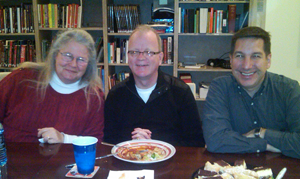
Betty Brendel–Logistics Manager, Don Sprague–Editor,
Allan Bolchazy–Vice President
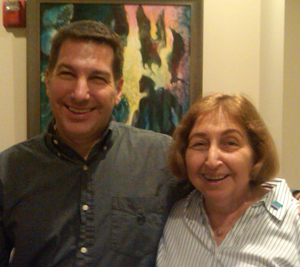
Allan Bolchazy and Marie Bolchazy–President |
|
 |
|
It’s that time of year again! Hard upon us all is the rush of the holidays, accompanied by, for teachers, that often dreaded end-of-semester task of constructing and then grading semester exams. There are as many variables to consider when writing exams as there are different classroom constellations, but I thought a few general pointers on exam construction would be welcome. Along the way, I’ll suggest a few helpful resources, too.
Exams are even more stressful for kids than they are for teachers. Some students simply want the grade; others want to impress you, their parents, or friends; and some less successful students view exams as yet one more way for school to knock them down. Discussing with students the value of semester exams may help address stress for some of them: Exams allow them to demonstrate that they can grasp knowledge in a cumulative fashion, which can help prepare them for college, where some course grades may rely exclusively on exams. Exam-taking skills will serve them broadly in their future, whether they go for a license in law, medicine, teaching, or even on their driver’s license exam. But don’t expect to convince the angry ninth grader that an exam is anything but a hurdle.
A thorough cumulative exam is a thing of beauty: It can reveal both what students have learned and what their potential is. True, if they do not have a solid base of basic vocabulary words, they will have trouble reading anything you give them. And if they don’t have a grasp of grammatical concepts, they will struggle with an inflected language like Latin or Greek. But even if the most a student can tell you is that in the sentence “Pueri boves ad villam ducunt,” villam is accusative and that it means “house,” that’s measurable progress toward the ideal of someday being able to put it all together.
The following are some things to keep in mind when constructing exams.
(1) Keep goals in mind.
Keeping your program goals in mind is crucial when writing exams. Your scope and sequence will tell you what grammatical forms and functions you need to test, as well as the key vocabulary students should have mastered. But also consider the degree of mastery you can expect students to demonstrate. If your level II students have only recently learned passive verbs, you can expect recognition of the form and an understanding of the concept, and those are what you should test. A few multiple-choice questions can check their mastery of forms. A reading passage that asks for main-idea comprehension will assess their understanding. Asking them to change active to passive, however, would be better reserved for the final exam, after they have had more practice. Always assess your students at their actual level, not at the ideal for the level of instruction, because the proficiency level of classes varies from year to year.
(2) Less is more.
An exam that takes your best students the full time period to complete is not as effective as a more precise exam that allows students the time to think. Don’t feel compelled, for example, to put every single vocabulary word on the exam. As long as students know that every word is fair game, it won’t matter which ones you leave off. And don’t be tempted to give overly long passages. Students should have time to read through a passage a few times before they answer.
(3) Practice the tasks before the exam.
To alleviate exam stress, remind your students of the tasks they’ll encounter on the exam, and practice those tasks in the weeks leading up to the exam. For example, I always made sure my students knew that if an exam question was in Latin, they had to answer in Latin, and if the question was in English, they had to answer in English. But your exams, you say, always include precise directions? Well, a student who is anxious may not even read those beautifully written directions, or may misread them. Practicing the tasks that will actually appear on the exam benefits all students.
(4) Use teacher-friendly grading.
I dreaded those semesters when our exam was the last in the schedule and the grades were due right away. Sorting through the translation portion of the exam was a chore that, despite good intentions, I always procrastinated doing. When we changed our method of grading translations to incorporate the chunking method that the AP* exam uses—a system that can be adapted for any Latin passage at any level, I found grading translations much less laborious. The chunking system saves time as well as sanity. It is explained in the Teacher’s Manuals for A Caesar Workbook and A Vergil Workbook. You can also see examples of this system in the key for the translation exercises in the workbook. If you are not familiar with this method, it is well worth a look.
Finding passages for reading comprehension and translation can be another time-consuming chore. If you need to have multiple versions of your exam, it is helpful to have a selection of passages of comparable length and difficulty that you can mix and match. Many textbook series have additional readings in their teacher’s guides. You can also use texts from the student workbook that students didn’t read in class. For members of the Latin for the New Millenium Teachers’ Lounge “sight reading” reproducibles provide readings from the workbooks for LNM 1 and 2, along with a set of 10 multiple choice questions that test comprehension.
As always, I look forward to your feedback and suggestions for future columns.
Sherwin Little
slittle6@cinci.rr.com |
|
 |
|
Teaching Tip
A Holiday-Themed Latin Text |
The Feast of St. Nicholas is December 6.
On the evening prior, children traditionally put their shoes out for the visit of Santa Claus. Good children awaken to find their shoes filled with treats while coal fills the shoes of those children deemed “naughty.” The following adapted Latin reading, ideal for Latin 1 or 2 students, introduces the original St. Nick. Teachers may reproduce the adapted Latin text for their students. [A version of this teaching tip appeared in the November 2010 eLitterae.]
Nīcolāus dē Myrā (c. 270 CE to c. 345 CE)
Adapted from Symeon Metaphrastes, Stories of Christianity
Nīcolāus dē Myrā erat Epīscopus Ecclēsiae Christiānae urbis Myrae in Āsiā Minōre. Persecūtiōnem Rōmānī Imperātōris Dioclētiānī Nīcolāus tulit. Quandō Cōnstantīnus factus est prīmus Christiānus Imperātor Rōmānōrum, Nīcolāus līberātus est et iterum Christiānōs in Myrā cūrāvit. Mortuus est sextō diē Decembris.
Nīcolāus hominēs dīlēxit. Praecipuē līberōs amāvit. Fābulae dē eō multae sunt. Divītiās dē patre habuit, et dōna, praecipuē in nātālī Iēsū, līberīs dedit. Post mortem Nīcolāī, hominēs dōna dedērunt in nātālī Iesū et dīxērunt, “Sunt dōna Sānctī Nīcolāī.”
In multās terrās fābulae Sānctī Nīcolāī portātae sunt. Fōrmae nōminis eius sunt “Sinterklaus” et “Santa Claus.”
Translation
Nicholas of Myra was Bishop of the Christian Church of the city of Myra in Asia Minor. He endured the persecution of the Roman Emperor Diocletian. When Constantine was made the first Christian Emperor of the Romans, Nicholas was freed and again took care of the Christians in Myra. He died on the sixth of December. Nicholas loved people. He especially loved children. The stories about him are many. He had riches from his parents, and he gave gifts to children, especially on the birthday of Jesus. After the death of Nicholas, people gave gifts on the birthday of Jesus and said, “They are gifts of Saint Nicholas.”
The stories of Saint Nicholas were carried into many lands. Forms of his name are “Sinterklaus” and “Santa Claus.”
This Latin reading is excerpted from Rose Williams’s A Beginning Latin Christian Reader: De Bonis Cogitationibus; the translation from its teacher’s guide.
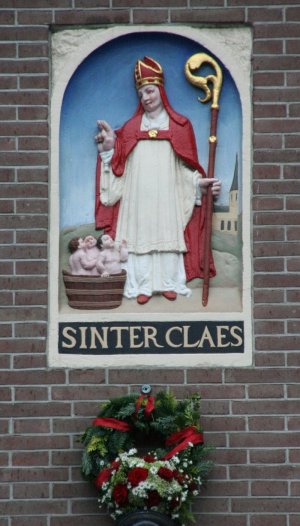
This Sinter Claes image has served as a house-identifier on the important Dam Square in Amsterdam since the 1600s. Over the centuries, as buildings were torn down, the stone tablet has been saved and affixed to the new building. Presently, it is embedded on the second floor with a branch of ABN-AMRO Bank on the ground floor. Photo courtesy of Wikimedia Commons. |
|
 |
|
Classical Association of the Midwest and South – Southern Section 2012 Report Highlights |
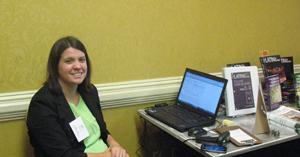
Bridget Dean at the ready to use B-C’s new credit card sales-processing equipment. The digital system cuts customer waiting time.
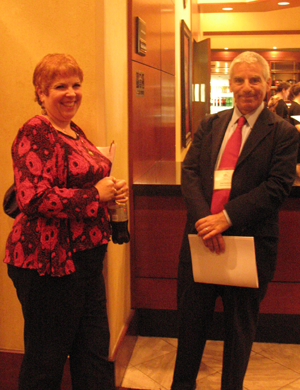
CAMWS-SS Secretary-Treasurer Davina McClain and John Marincola, FSU classics chair and new CAMWS-SS president, spent much time together consulting and double-checking that the conference moved along smoothly.
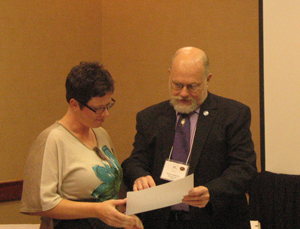
Tom Sienkewicz, CAMWS Secretary-Treasurer, presents Jaime Claymore of Mountain View High School, Georgia, a certificate recognizing her as a CAMWS travel scholarship recipient. Claymore joined five Georgia colleagues as a presenter for the Georgia Classical Association’s very informative and helpful panel “The Road to Gaul.”
Bridget Dean and Don Sprague represented B-C at the CAMWS-SS biennial conference held in Tallahassee, November 1–3 at the invitation of Florida State University. Tallahassee is an interesting combination of state capital with the requisite office suites of lobbyists and interest groups and college town with bountiful references to FSU’s Seminoles or Noles and to FAMU’s Rattlers (Florida A&M University, the nation’s largest historically-black college). The delightful weather was a respite for Chicagoans and others from the Midwest as well as for those from the Northeast who were able to escape Sandy’s aftermath.
The conference took place at the Double Tree Hotel downtown and near Florida State University. Exhibitors set up their displays in a nice room right off the main lobby and next to both registration and refreshments. Such proximity attracted a good number of the attendees to check out B-C’s four-table display of books. The conference drew 166 attendees as of Saturday morning, 131 pre-registered, 17 on-site registrants, and 18 volunteers. Of these 166, 65 were first time CAMWS-SS attendees.
While the exhibit required much of Don and Bridget’s attention, they carefully carved out time to attend a number of presentations and to give presentations themselves. Here follow some highlights from the sessions they were able to attend. Madeleine Henry and her colleague, Elisa Rizo, a professor of Spanish at Iowa State discussed their collaboration on the intersection of Classics and Afro-Hispanic culture. Jane Crawford, University of Virginia, gave a terrific talk on the language of war in Caesar. Such a topic is a departure for Jane who regularly writes and presents on Cicero. So imbedded is her devotion to Cicero that she unconsciously referenced Cicero in her Caesar talk when she meant to reference Caesar! Jane currently serves as Cochair of the AP* Latin Development Committee. Michele Valerie Ronnick dedicated her informative talk on Seneca’s Epistle 82 to Lou Bolchazy. Georgia Irby’s presidential address “Drawing Maps with Words: Have you Not Heard of Floryda?” gave an informative overview of geography in the ancient world and the early modern world.
Don and Bridget both presented at CAMWS-SS. Their session was Friday afternoon, when by tradition, the CAMWS program moves to the campus of the host university. After a brief detour to the lovely history museum, complete with stained glass windows, in the Classics building, they arrived at a beautifully retrofitted building with state of the art technology for their presentations. The panel attracted a couple dozen attentive attendees. Don’s presentation on LNM 3 was met with excellent audience comments, including one attendee who raised his hand just to congratulate him on the fine work “impressive . . . must have been a huge undertaking.” Bridget’s presentation, revised to reflect AcademicPub’s recent updates, went well and elicited a number of questions and comments. The session ended with a splendid Rome-inspired spectacle as Patsy Ricks and Debbie Good of St. Andrew’s Episcopal School (Jackson, MS) shared their “Rome WAS built in a day” annual celebration. This all school event has significantly increased Latin enrollments at St. Andrew's. A student-produced video of the day's events evoked gasps of awe and much applause from the attendees!
Don and Bridget were very touched by the number of attendees who stopped by the exhibit to inquire about Marie Bolchazy and to offer their condolences on Lou's death. CAMWS-SS officially recognized Lou in the program and at the business meeting. The conference program listed the remembrance of Lou with the agenda for the business meeting and included a large image of bubo, the B-C owl. At the business meeting both Georgia Irby, the president, and Davina McClain spoke of Lou, his contribution to classics, and their own personal interactions with him.
Kudos to the seemingly indefatigable Davina McClain and her crew of volunteers for a very successful conference. Davina was unfailingly attentive and pleasant the entire conference. Her energy and smile were contagious. |
|
 |
|
For high school teachers, we are pleased to announce a special series of webinars on Caesar and Vergil scheduled for February and March 2013.
For college instructors, Milena Minkova, coauthor of Latin for the New Millennium, Levels 1 and 2, will provide tips for using the new College Exercise Book for LNM.
Mark your calendars and register now as these are sure to fill fast!
LNM for the College Classroom: Integrating the College Exercise Book - January 29, 2013, 12:30–1:30 p.m. (Eastern Time)
Presented by Milena Minkova, Professor of Classics, University of Kentucky
Milena Minkova the coauthor of Latin for the New Millennium, Levels 1 and 2, will offer an overview of using the new introductory series Latin for the New Millennium, Levels 1 and 2, at the collegiate level with particular emphasis on how to integrate the new College Exercise Book. Dr. Minkova is Professor of Classics at the University of Kentucky. She has published on Latin literature in its continuity, 12th century Renaissance, Latin Composition, Latin Pedagogy, and Active Latin.
Themes Connecting Caesar and Vergil - February 5, 2013, 6:00–7:00 p.m. (Eastern Time)
Presented by Mary Pendergraft, Classics Professor, Wake Forest University
Professor Pendergraft is much respected by her university colleagues, her students, and her high school colleagues for her scholarship and her insights into pedagogy. Her presentation will explore themes that connect Caesar and Vergil, the two writers united by the new AP* curriculum. Dr. Pendergraft has served as a state and national consultant on Latin curriculum and standards. She performed yeoman service as the Chief Reader for AP Latin for four years and as a contributor to the development of the new curriculum. Her topic was suggested by fall webinar participants and promises to be an excellent learning opportunity as teachers gear up for the second semester of AP* Latin.
Casus belli: Caesar and the Use of Force - February 19, 2013, 6:00–7:00 p.m. (Eastern Time)
Presented by Hans-Friedrich Mueller, Classics Professor, Union College
Hans-Friedrich Mueller, popular classics professor and department chair at Union College, is recognized for his scholarship and insights on Caesar. For the past couple years, Dr. Mueller has been immersed in Caesar as he worked on Caesar: Selections from His Commentarii De Bello Gallico, a text written to address the new AP* Latin curriculum. In the Teacher's Guide for this text, he provides a comprehensive set of discussion and analysis questions for the Latin passages and a series of questions that make connections between Caesar and Vergil. With Rose Williams, he is the coauthor of Caesar: A LEGAMUS Transitional Reader, which introduces students to both De Bello Gallico and De Bello Civili.
In this webinar, “Casus belli: Caesar and the Use of Force,” Professor Mueller asks apart from good grammar and a clear Latin style, what political, cultural, and historical lessons will Caesar bring with him in his recent return to the high school classroom? How can teachers productively lead discussions about his legacy, which remains as controversial as ever? This webinar will take up one important thread in Caesar's career, his use of force, review its role in his private and public life, and invite participants to a wider discussion about how we, as teachers, can discuss important ethical, legal, and political issues from a variety of points of view.
Pius Julius: Julius Caesar and the State Religion - March 12, 2013, 6:00–7:00 p.m. (Eastern Time)
Presented by Hans-Friedrich Mueller, Classics Professor, Union College
“Pius Julius: Julius Caesar and the State Religion,” illuminates Caesar's religious persona from his role as pontifex maximus to that of general referencing Fortuna in his narrative. This webinar provides a fuller context for understanding the complex individual who was Julius Caesar.
Click here to register for FREE Webinars
To participate in Bolchazy-Carducci Publisher sponsored webinars you will need high-speed internet access, computer speakers/headphones, current web browser with updated “Flash Player”*, and the link to the webinar virtual meeting space, which is provided in your webinar invitation.
*Current web browsers: Internet Explorer 8, FireFox 3, Google Chrome, Safari 4 or 5. Flash Player available from Adobe.com: http://get.adobe.com/flashplayer/. Consult your school IT dept.
Webinars for Professional Development
Participation is free. All webinars provide opportunity for participants to ask questions. Learn lots – attend each presentation. Sign up for this professional development webinar. Bolchazy-Carducci Publishers will provide documentation for your participation. |
|
 |
|
Caesar and Vergil Teaching Resources |
For those who missed Debra Nousek’s and Rose Williams’s webinar “Taming Caesar: Analysis and Strategies for Teaching Caesar’s Grammar,” you can access it at http://roserwilliams.com/TamingCaesar.pdf.
The Bolchazy-Carducci AP* website provides resources related to its AP* Caesar and AP* Vergil titles.
The College Board website offers a wealth of materials for teacher and student enrichment and AP*-skill enhancement. For example, the site offers four different pacing models for the AP* curriculum, including one developed by David Pellegrino, author of the B-C Caesar Vocabulary Cards. |
|
|
Latin for the New Millennium Teaching Tip for College Instructors |
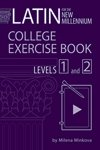
Bolchazy-Carducci is very pleased with the number and range of colleges and universities that are using Latin for the New Millennium for their introductory Latin courses. To meet the special needs of college students, Milena Minkova has developed the College Exercise Book. This new college text, based on Latin for the New Millennium, Levels 1 and 2, by Milena Minkova and Terence Tunberg, offers a wealth of exercises to aid students in and out of class. With many answers provided in the back of the book, students can self-check their work and practice difficult concepts on their own time. Offering 7–9 exercises for every chapter of LNM 1 and 2, the College Exercise Book is a must-have resource for any college student using LNM.
Features exercises on
• producing forms and phrases
• translating phrases
• defining/parsing forms
• changing forms and phrases
• translating sentences/paragraphs into English
• translating sentences/paragraphs into Latin
• producing verbal synopses
Professor Minkova will be presenting a webinar on the College Exercise Book, January 29, 2013. (Register for this webinar) |
|
 |
|
A New Assessment for Teaching Candidates and Students:
ALIRA – The ACTFL Latin Interpretive Reading Assessment |
ALIRA was created through a collaborative effort between The American Classical League and the American Council on the Teaching of Foreign Languages. It is a first of its kind assessment that is based on both the National Standards for Foreign Language Learning and the Standards for Classical Language Learning. It is a four-option, multiple choice, computer-adaptive assessment that can be delivered in a single class period. This new assessment serves several purposes.
- Teachers can see their students’ development in the continuum of their skills in reading Latin. By looking at the results of groups of students, teacher can see where in their curriculum that more reading practice is needed.
- Teachers-in-training can receive a proficiency rating which may be required for licensure or certification.
- Students can track their progress, and they can discover what skills they may need to develop to become more proficient readers.
The first administration will be in January/February 2013. The assessment will also be available every year in January/February, April/May, and September/October.
For more information, go to www.actfl.org/Latin.
[Columnist Sherwin Little devoted beaucoup hours to the development of this new assessment.]
Professional Development Opportunity
ACTFL and ACL are offering an online, self-study course called Classics in the 21st Century Classroom. Upon completion teachers may claim continuing education credit by notifying ACL.
For additional questions about either the ALIRA or Professional Development, contact Aliratest@gmail.com. |
|
 |
|
Special Holiday Title Discounted for eLitterae Subscribers |
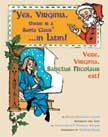
Yes, Virginia, There Is a Santa Claus . . . In Latin!
Vere, Virginia, Sanctus Nicolaus est!
by Matthias Kringe, Francis Pharcellus Church, Virginia O’Hanlon; translated by Hermann Wiegand, Walter Sauer
For 105 years Virginia O’Hanlon’s question and editor Church’s response have been an integral part of the Christmas tradition. This text, with its new Latin translation, in ornate script with decorated capitals and its full-color, charming illustrations, makes a perfect holiday gift. Purchase a classroom set for a holiday enrichment activity.
32 pp. (2001) Hardbound
ISBN 978-0-86516-506-9 $10.00 $8.00
(no returns, not available to distributors.
This offer expires 12/31/12)
Make sure to mention that you are an eLitterae subscriber if you place your order by phone or fax. If you place your order via www.BOLCHAZY.com the special eLitterae offer pricing will be charged at checkout. |
|
|
|
|
